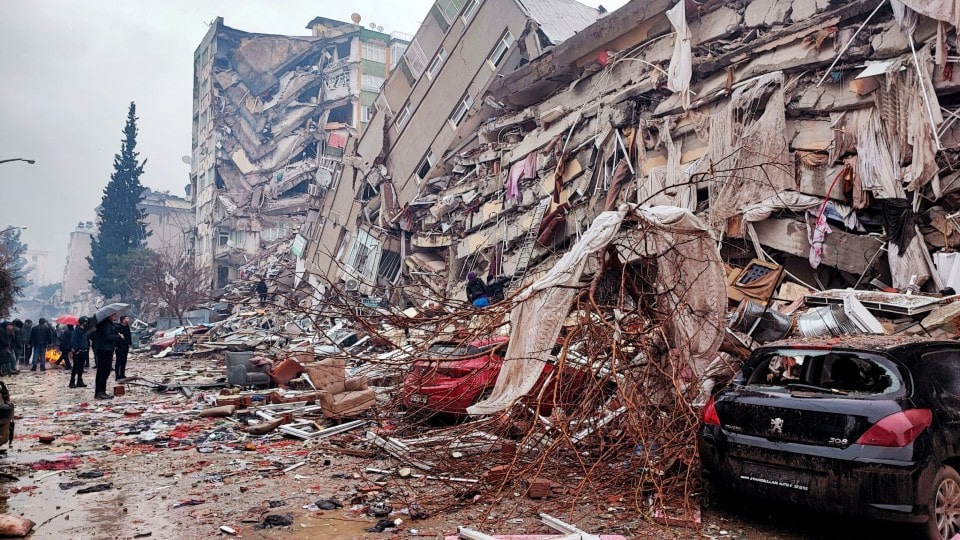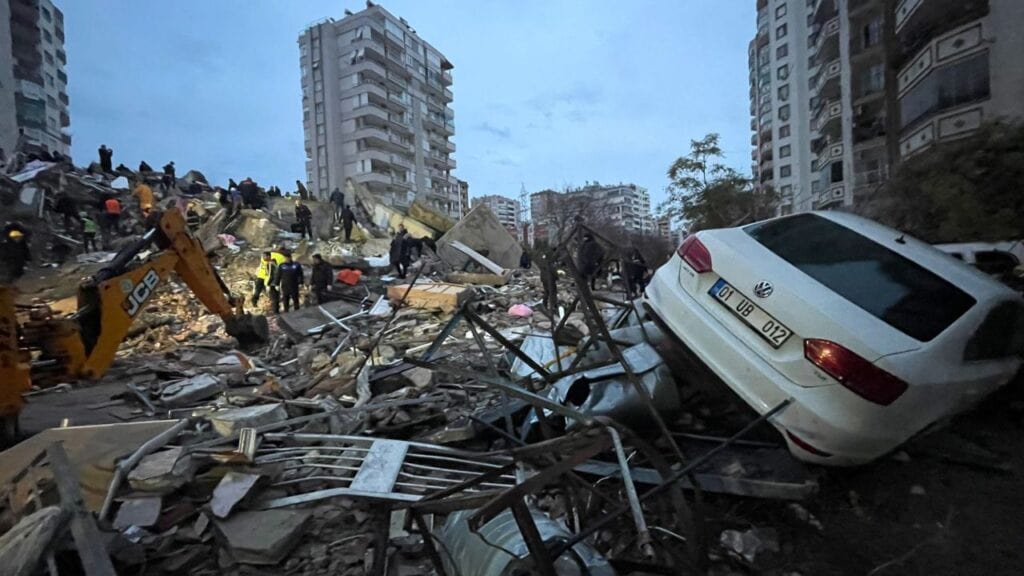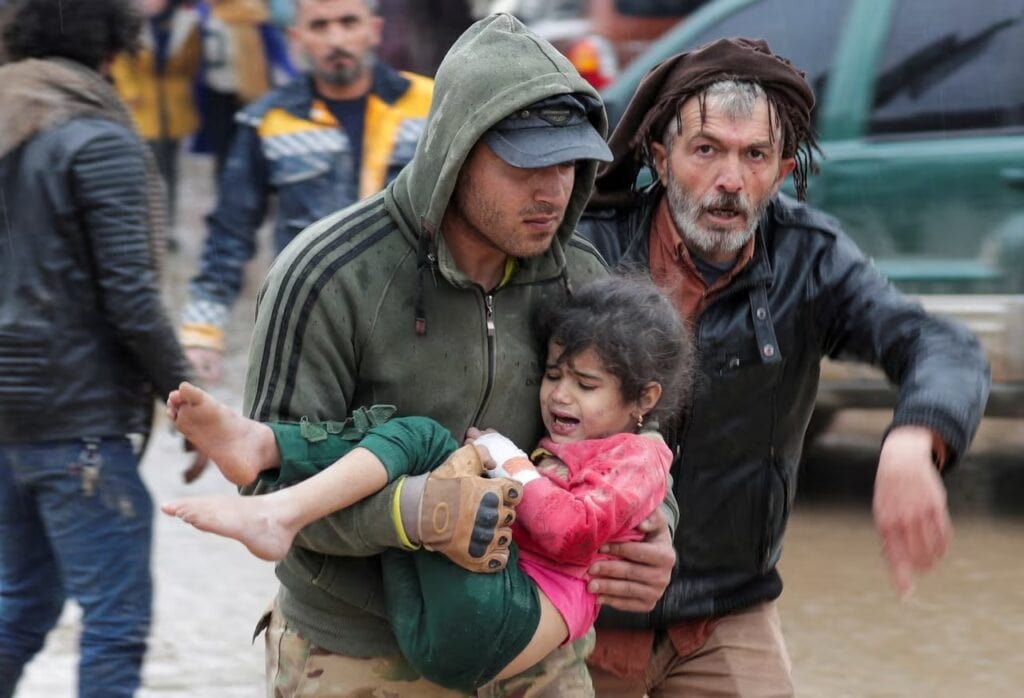As the death toll from one of the worst earthquakes to hit Turkey in 100 years went past 600 people, rescuers are frantically searching for survivors buried in rubble on either side of the Turkey-Syrian border.
Around 4 a.m. on Monday, a 7.8-magnitude earthquake that had tremors as far away as Lebanon and Israel scared residents out of their beds and resulted in thousands more injuries.
According to the United States Geological Survey (USGS), the epicenter of the earthquake was 24.1 kilometers (14.9 miles) beneath the surface, 23 kilometers (14.2 miles) east of Nurdagi in Turkey’s Gaziantep province.
Video from the site in Turkey showed people waiting for assistance as day broke over rows of collapsed buildings, some with apartments exposed to the elements.
According to Vice President Fuat Oktay, at least 284 people have died and more than 2,300 have been injured in Turkey. At least 386 people perished in neighboring Syria, principally in Aleppo, Hama, Latakia, and Tartus, according to Syrian official television.

Additionally, the “White Helmets” organization—officially known as the Syria Civil Defense—reported at least 147 fatalities in northwest Syria’s opposition-held regions. In the midst of a violent civil conflict that started in 2011, anti-government forces control a large portion of northwest Syria, which borders Turkey.
According to the USGS, Monday’s earthquake is thought to be the largest to hit Turkey since 1939, when an earthquake of the same magnitude killed 30,000 people. Less than five earthquakes of this size strike the planet each year on average, making them extremely uncommon events. Turkey has seen seven earthquakes of magnitude 7.0 or higher in the past 25 years, but Monday’s was the most intense.
According to Karl Lang, an assistant professor at Georgia Tech University’s School of Earth and Atmospheric Sciences, the earthquake-prone region was affected on Monday. It’s a very big fault zone, but this is the biggest earthquake they’ve had recently, according to Lang.
“It seemed like it would never end.”
When the earthquake hit early on Monday, Gaziantep-based journalist Eyad Kourdi, who was visiting his parents at the time, said “it felt like it would never be over.”
Kourdi and his dad left their house after the shaking subsided while they were still in their jammies, he claimed.
They waited outside in the rain for approximately thirty minutes while he went back inside to get coats and boots; there was several inches of snow on the ground.
Southern and central Turkey have both experienced powerful aftershocks. The strongest aftershock, measuring 6.7 in magnitude, struck around 32 kilometers (20 miles) northwest of the original earthquake’s epicenter about 11 minutes later. 19 minutes after the initial quake, a powerful aftershock with a magnitude of 5.6 was felt.

After the 7.8 magnitude earthquake, Kourdi claimed there were up to eight “extremely strong” aftershocks in less than a minute, which caused items in his home to fall to the ground. He claimed that many of his neighbors had evacuated after the earthquake.
As day broke in Turkey, images revealing the disaster’s actual scope appeared. Metal rods have been scattered over the streets, and entire structures have been flattened. Bulldozers are clearing the debris as cars crash down.
The strong earthquake caused extensive damage to Gaziantep Castle.
According to CNN meteorologists, a winter storm in the area is making the situation worse.
“This affects hundreds of thousands of individuals. It’s chilly. There is rain. Roads may be affected, which might affect your access to food, a source of income, and the ability to care for your family and children, according to CNN meteorologist Karen Maginnis.
“Anything growing in this region, including crops, will also be affected. The effects of this will be felt throughout this area for weeks and months.
Suleyman Soylu, Turkey’s interior minister, said that teams have been sent to the south of the nation to conduct search and rescue operations. The European Union’s humanitarian program, the Emergency Response Coordination Centre (ERCC), claimed that the disaster agency, AFAD, has asked for assistance from abroad.
According to its governor, Ali Yerlikaya, around 1,000 search and rescue volunteers, along with dogs, trucks, and equipment, have been sent from Istanbul, the largest city in Turkey.
“Sorry about the loss. I wish the best for all who were hurt,” Yerlikaya tweeted.
Davut Gul, the governor of Gaziantep, tweeted that “the earthquake was felt powerfully in our city” and urged people to wait outside of their homes and maintain composure.
Let’s calmly wait outside, please. Don’t let’s drive our cars. Do not congest the key thoroughfares. Let’s not overuse the phones, he said.
According to Asli Aydintasbas, a fellow at the Brookings Institute, there are a number of small- and medium-sized cities in the province of Gaziantep that have large refugee populations.
These places aren’t all that well off. Some metropolitan regions are wealthier than others. However, other locations that are being discussed that appear to have been decimated are located in relatively lower-income communities, she added.

Rescuers can be seen in video from Diyarbakir, a city northeast of Gaziantep, working feverishly to extricate survivors from the rubble.
The earthquake, according to Turkish President Recep Tayyip Erdogan, was felt over much of the nation.
“I send my warmest condolences to all of our countrymen who were impacted by the earthquake that struck Kahramanmaraş and was felt throughout much of our nation. Under the direction of AFAD, all of our pertinent units are on alert, Erdogan stated on Twitter.
As world leaders awoke to the news of the fatal earthquake on Monday morning, messages of sympathy and solidarity began to flood in.
National Security Advisor for the White House Jake Sullivan stated that the US was “profoundly concerned” about the devastation in Turkey and Syria.
“I have spoken with Turkish officials to let them know that we are prepared to offer any support that may be required. In collaboration with Turkiye, we’ll keep a careful eye on the situation, Sullivan tweeted.




